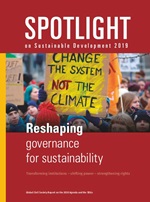Published on Wed, 2019-10-23 14:40
Inequality is a major concern for civil society in Bangladesh. The report by the Equity and Justice Working Group Bangladesh (EquityBD) quantifies rising inequalities. The Palma ratio (between the income of the richest 10% and that of the poorest 40%) grew from 1.68 in 1964 to 2.93 in 2016. Inequalities are addressed in the official plans but EquityBD considers that implementing them “will be a tough job for the Bangladesh government due to lack of good governance in some cases. The financial sector is still in a need of special attention since illicit financiale flows and huge amounts of non- performing bank loans are still in force. Decentralization of development is another crucial issue.” |
Published on Wed, 2019-10-23 14:30
The 2030 Agenda aims at “a world of universal respect for human rights and human dignity…of respect for race, ethnicity and cultural diversity”. But in what instances and in what ways is governance — as the mechanisms by which a government weighs and evaluates competing claims and chooses a path — itself a confounding factor that undermines the aspirations articulated in the 2030 Agenda? This analysis, by Marina Lent, of the Global Policy Forum (GPF), examines the role of governance in maintaining the obvious chasm between aspiration and reality through the experience of the loss of indigenous peoples’ territories. |
Published on Tue, 2019-10-22 14:25
The 5th session of the open-ended working group on transnational corporations and other business enterprises with respect to human rights (OEIGWG) met in Geneva on 14 to 18 October 2019. This marked the beginning of intergovernmental negotiations on the basis of a revised draft legally binding instrument (LBI) published in July 2019. Kinda Mohamadieh, from Third World Network, says the 5th meeting of the OEIGWG was a success in advancing the discussions and clarity on various elements of the revised text. Yet, some core issues continue to generate different approaches in the working group, including the scope of the proposed treaty, the extent of new obligations that the proposed treaty should impose on States, the possibility and ways of addressing direct obligations of business enterprises, and the scope of human rights law to be covered under the LBI. |
Published on Sun, 2019-10-20 12:58
The UN Inter-Agency and Expert Group on the SDG Indicators (IAEG-SDGs) is in the final stages of preparing its proposals for the 2020 Comprehensive Review of the global indicator framework of the SDGs, to be submitted to the Statistical Commission by 30 November. The IAEG-SDGs was established by the UN Statistical Commission to identify a set of indicators by which to measure progress on the SDGs. The resulting global indicator framework was debated at the Commission meeting in March 2016 and accepted subject to refinements as methodologies improved. Thereafter the framework was submitted for an extensive online consultation and the process of revising it has continued through nine biannual IAEG-SDGs meetings—attended by agencies and member states as well as civil society. |
Published on Thu, 2019-10-10 09:40
The High-level Dialogue on Financing for Development (FfD) on 26 September featured inspired discussions on combatting illicit financial flows, financing the SDGs and climate action against rising debt burdens, highlighting the need for structural, macroeconomic changes to lending and trade in order to best equip countries to achieve the SDGs. Secretary-General António Guterres noted that ‘collaboration is crucial in cracking down on tax avoidance, tax evasion, corruption and illicit financial flows that deprive developing countries of tens of billions of dollars of potential resources for their development every year’. |
SUSCRIBE TO OUR NEWSLETTER






